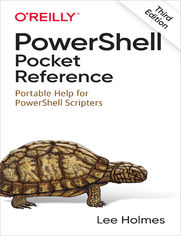PowerShell Pocket Reference. 3rd Edition - Helion

ISBN: 9781098101633
stron: 228, Format: ebook
Data wydania: 2021-04-22
Ksi─Ögarnia: Helion
Cena ksi─ů┼╝ki: 72,24 z┼é (poprzednio: 84,99 z┼é)
Oszczędzasz: 15% (-12,75 zł)
This portable reference to PowerShell summarizes the command shell and scripting language and provides a concise guide to the many tasks that make PowerShell so useful. If you're a busy administrator and don't have time to plow through huge books or in-depth online searches, this is the ideal on-the-job tool.
Written by PowerShell team member Lee Holmes and excerpted from his PowerShell Cookbook, this edition offers up-to-date coverage of Windows PowerShell 5.1 and open source PowerShell Core up to 7 and beyond.
Beginning with a guided tour of PowerShell, this handy guide covers:
- PowerShell language and environment
- Regular expression reference
- XPath quick reference
- .NET string formatting
- .NET DateTime formatting
- Selected .NET classes and their uses
- WMI reference
- Selected COM objects and their uses
- Standard PowerShell verbs
Osoby które kupowały "PowerShell Pocket Reference. 3rd Edition", wybierały także:
- The Ansible Workshop. Hands-On Learning For Rapid Mastery 665,00 zł, (39,90 zł -94%)
- Cisco CCNA 200-301. Kurs video. Administrowanie bezpiecze┼ästwem sieci. Cz─Ö┼Ť─ç 3 665,00 z┼é, (39,90 z┼é -94%)
- Cisco CCNA 200-301. Kurs video. Administrowanie urz─ůdzeniami Cisco. Cz─Ö┼Ť─ç 2 665,00 z┼é, (39,90 z┼é -94%)
- Cisco CCNA 200-301. Kurs video. Podstawy sieci komputerowych i konfiguracji. Cz─Ö┼Ť─ç 1 665,00 z┼é, (39,90 z┼é -94%)
- Jak zhakowa 125,00 zł, (10,00 zł -92%)
Spis tre┼Ťci
PowerShell Pocket Reference. 3rd Edition eBook -- spis tre┼Ťci
- A Guided Tour of PowerShell
- Introduction
- An Interactive Shell
- Structured Commands (Cmdlets)
- Deep Integration of Objects
- Administrators as First-Class Users
- Composable Commands
- Techniques to Protect You from Yourself
- Common Discovery Commands
- Ubiquitous Scripting
- Ad Hoc Development
- Bridging Technologies
- Namespace Navigation Through Providers
- Much, Much More
- Conventions Used in This Book
- Using Code Examples
- OReilly Online Learning
- How to Contact Us
- 1. PowerShell Language and Environment
- Commands and Expressions
- Comments
- Help Comments
- Variables
- Booleans
- Strings
- Literal and Expanding Strings
- Here Strings
- Escape Sequences
- Numbers
- Simple Assignment
- Administrative Numeric Constants
- Hexadecimal and Other Number Bases
- Large Numbers
- Imaginary and Complex Numbers
- Arrays and Lists
- Array Definitions
- Array Access
- Array Slicing
- Hashtables (Associative Arrays)
- Hashtable Definitions
- Hashtable Access
- XML
- Simple Operators
- Arithmetic Operators
- Logical Operators
- Binary Operators
- Other Operators
- -replace (Replace operator)
- -f (Format operator)
- -as (Type conversion operator)
- -split (Split operator)
- -join (Join operator)
- Comparison Operators
- Conditional Statements
- if, elseif, and else Statements
- Ternary Operators
- Null Coalescing and Assignment Operators
- switch Statements
- Looping Statements
- for Statement
- foreach Statement
- while Statement
- do while Statement/do until Statement
- Flow Control Statements
- break
- continue
- Classes
- Base classes and interfaces
- Constructors
- Properties
- Methods
- Custom Enumerations
- Workflow-Specific Statements
- InlineScript
- Parallel/Sequence
- Working with the .NET Framework
- Static Methods
- Instance Methods
- Explicitly Implemented Interface Methods
- Static Properties
- Instance Properties
- Learning About Types
- The Get-Member cmdlet
- .NET Framework documentation
- Type Shortcuts
- Creating Instances of Types
- Interacting with COM Objects
- Extending Types
- The Add-Member cmdlet
- Custom type extension files
- Writing Scripts, Reusing Functionality
- Writing Commands
- Writing scripts
- Writing functions
- Writing script blocks
- Running Commands
- Invoking
- Dot-sourcing
- Parameters
- Providing Input to Commands
- Argument array
- Formal parameters
- Command behavior customizations
- Parameter attribute customizations
- Parameter validation attributes
- Pipeline input
- Cmdlet keywords in commands
- $MyInvocation automatic variable
- Retrieving Output from Commands
- Pipeline output
- Return statement
- Exit statement
- Writing Commands
- Managing Errors
- Nonterminating Errors
- Terminating Errors
- Formatting Output
- Custom Formatting Files
- Capturing Output
- Common Customization Points
- Console Settings
- Adjust your font size
- Adjust other Windows Terminal settings
- Use hotkeys to operate the shell more efficiently
- Profiles
- Prompts
- Tab Completion
- User Input
- Command Resolution
- Console Settings
- 2. Regular Expression Reference
- 3. XPath Quick Reference
- 4. .NET String Formatting
- String Formatting Syntax
- Standard Numeric Format Strings
- Custom Numeric Format Strings
- 5. .NET DateTime Formatting
- Custom DateTime Format Strings
- 6. Selected .NET Classes and Their Uses
- 7. WMI Reference
- 8. Selected COM Objects and Their Uses
- 9. Selected Events and Their Uses
- Generic WMI Events
- 10. Standard PowerShell Verbs
- Index





